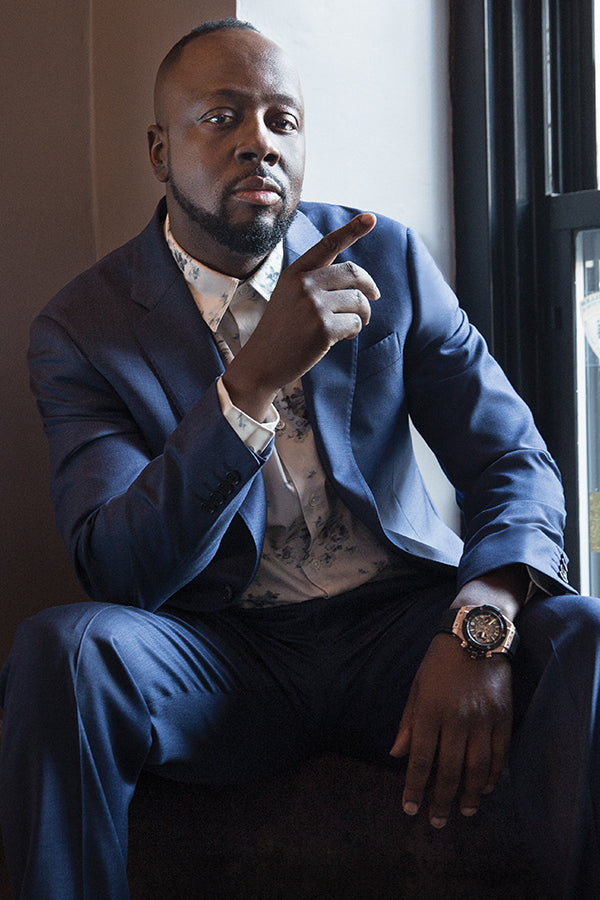Taking the Leap
“If you want to know the DNA of an artist, you’ve got to see how they started. I studied, I always used to watch Michael Jackson. One of my favorite musicians is Prince. All I try to do is bring a revival to the stage. When I perform, it’s like going to the carnival. I just bring that entire energy of where I come from. I just brought you the sound system,” shares Wyclef Jean sitting in a NYC hotel room in late December. After having a rough 12 hours with sudden family matters, he is now buzzing with excitement – he FaceTimes with his wife Claudinette and calls her Janet Jackson (while he calls himself a ninja).

Filled with many talents and life experiences, Jean is acting as a bridge between the old school and the new school. He’s taken some young artists under his wing and mentored them – which resulted in Wyclef Goes Back to School, inspired by his 2018 Carnival Tour. “You don’t get a chance to be on Eastern Parkway, to see that energy and how we drive. You don’t get a chance to be in Trinidad or Haiti when it goes down, or parts of Brazil. I’m part of these DNAs so for me, my shows are a celebration of life,” says Jean. He came to the United States in 1979 from Haiti. The move landed his family in the Marlboro projects in Brooklyn – a stark contrast from his rural Haitian upbringing. “If you’re an immigrant, or you come from the Caribbean, especially, it’s literally a culture shock. The village where I was from, I took a donkey to school. When you get to the States, the hardest thing is trying to adjust. It was tough, you can imagine – the 80s in Brooklyn, it was no joke,” he recalls. Ronald Reagan was trying to restructure the country, crack was taking over neighborhoods, and hip-hop was slowly starting to take form and develop its voice as a musical genre. Jean was also trying to find himself during this time as his friends disappeared, with some of them drawn to the fast life of the inner-city streets.
For Jean, however, music was a way of expressing himself. “Before I could physically touch an instrument, I was already playing the orchestra in my brain. By the time I was 15 years old, I was already playing 10 instruments. A music teacher discovered me. I was in the auditorium and playing piano, and the music teacher was like, ‘What are you playing?’ I was like, ‘I don’t know, I can just hear it.’ She said, ‘That sounds like Thelonious Monk. Tomorrow, you’re starting jazz and classical music,’” Jean explains of the teacher who wanted him to learn how to read sheet music so that he could score his own movie one day and avoid paying someone else $50,000 to do it. During his adolescence, furthermore, Jean also loved classical literature – specifically, Shakespeare – which was all part of his plan to be a battle rapper as he wanted to take a character like “Malvolio and place him in an urban setting.” This lent itself to the melodic, often poetic lyrical content that the Fugees created.
Jean has since impacted the modern generation of rappers. His song “Thug Angels,” from The Ecleftic: 2 Sides II a Book, was one of the earliest forms of trap music with acoustic elements, whose sound is currently at the forefront of hip-hop. He’s had conversations with Drake about his 1997 solo debut The Carnival, and has also worked with younger artists like Young Thug and Kodak Black.
“I was always the weird kid. In an era where people were trying to define what hip-hop is, here comes a crew, and we’re gonna play instruments, we’re gonna sing these songs, and be poetic. I’ve always been light years ahead,” elaborates Jean who studies sound systems and understands the eclectic nature of hip-hop. “Everything you see the kids are doing today, it’s just normal. I’ve stayed relevant to the pulse.”
Writer: Leonye McCalla
Photographer: Ron Contarsy (for Highmark Studios)
Photographer Assistant: Sarkis Delimelkon
Fashion Editor: Lassalle (@stylebylassalle & @stevenlassalle_ - www.stevenlassalle.com)
Fashion Editor Assistants: Star Campbell (@starcampbellstylist) & Elizabeth Seifert (@lizseifert) & Huberta Marie (@huberta.marie)
Men’s Grooming: Marc Cornwall
Videographer: Jon Prosper
Editor: Eiko Watanabe
Special thanks to The Roosevelt Hotel (@rooseveltnyc - theroosevelthotel.com) & mad46 Rooftop Lounge (@mad46 - www.mad46.com)

